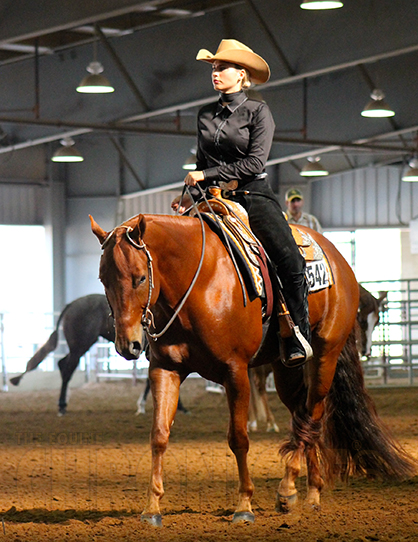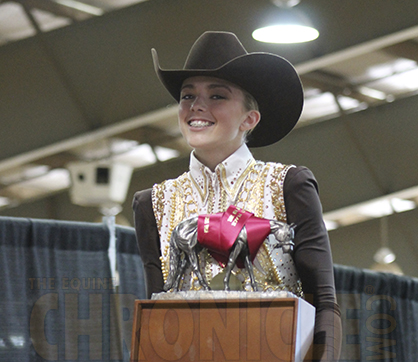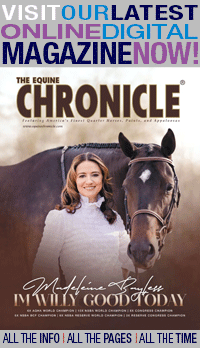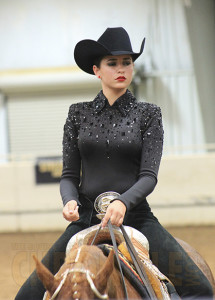Equestrians Seeking Equality For Non-School Sponsored Sports
It all began with a simple poster, one that Auburn High School senior Zach Oestmann hoped might hang in his school’s gymnasium alongside other posters celebrating students’ achievements in sports. For Oestmann, a rodeo rider since the age of three who has won three state titles in junior high, made the national finals three years in a row, and just received a full athletic scholarship to Fort Scott in Kansas, that didn’t seem like too much to ask.
However, he and his parents were told his poster wouldn’t be displayed in the school’s gym because rodeo isn’t a school-sponsored sport. While it’s not a written policy per say, an article from Omaha.com– (After Rodeo Athlete’s Parents Cry Foul, Auburn Schools Considering Allowing Posters For Non-School- Sponsored Activities), quotes the High School Principal saying it’s a “caveat” that has been in effect for years. Apparently, there are concerns about the consequences that might arise if one student in a non-school sponsored sport was permitted to hang his/her poster in the gym and about the school’s ability to control the content of the posters when it comes to freedom of speech.
Of course, this then evolved into the age-old conversation pitting traditional, school-sponsored sports like football and soccer against non-traditional, non-school sponsored sports such as equestrian, especially when it comes to related topics such as school-approved absences and the ability to make up missed work.
Undoubtedly, this environment might cause a student participating in a non-school sponsored sport to feel discriminated against. However, where should the school draw the line? Should they allow posters to hang for a child’s achievements in Underwater Basket Weaving or Quidditch? With valid arguments on both sides, parties gathered where such topics are discussed, a local school board meeting.
Enter Alicia Andrew, the owner of a horse and rider training facility in Dawson, Nebraska. Andrew and fellow equestrians are interested in creating a movement that will encourage schools across the country to recognize equestrian athletes and other students who participate in non-affiliated sports and activities.
 Here is the text of a speech she gave at the school board meeting:
Here is the text of a speech she gave at the school board meeting:
“My name is Alicia Andrew and I operate a horse and rider training facility located out of Dawson, NE. My connection to the issue regarding recognizing non-school affiliated sports and activities is that I train students from your district who compete nationwide year round in AQHA and ABRA events, earning high awards. I want to start by saying I’m here to support a positive change, not only in Auburn, but across the country. I plan to speak at other schools in hopes to create a domino effect for change, so I want to encourage Auburn to be a leader in a possible countrywide movement.”
“To me, the problem is two-fold. The first being that you’re leaving a lot of children behind by only recognizing student-athletes that compete in school affiliated sports and activities. Not every child is going to be good at, or passionate about, sports offered through his/her school. Where does that leave the other kids? I believe you’re creating a culture that only recognizes a small percentage of kids year round and others, slim to none. I think you’re even leaving out activities within your school, such as drama, band, and vocal students by not recognizing them equally. I want to give you a couple facts on school sports.”
*Only 2% of high school athletes win sports scholarships every year at NCAA colleges and universities and those that do get less than $11,000, on average (CBS Moneywatch).
*The percentage of high school athletes that advance to pro basketball is .03% for men and .02% for women. That’s one out of every 10,000 players.
*If you want to take it down a notch, the percentage of high school students that advance to college basketball is 2.9% for men and 3.1% for women.
“School sanctioned sports are wonderful, so fulfilling, and meaningful to many, but they’re not an end all nor more important than other non-sanctioned events such as rodeo, horse show, and competitive dance that can also lead to scholarships, careers, and awards.”
“The second problem is that there is a double standard being created. When my equestrian athletes want to miss school, they’re rarely met with no opposition, but kids in school clubs and sports miss up to 10-15 days of school a year. I recognize there needs to be standards set in place that kids need to live up to, in order to be dismissed. Another example is when schools let out school multiple days for state athletic competitions that your school qualifies for. What about the kids that don’t care to attend state basketball but would like to have two days off to prepare for and attend their national or state competitions?”
“To me, you’re putting athletics before education, in this instance, and you’re certainly creating a double standard, because when speech, vocal, or bands attend state competitions, I know, for a fact, that school is not let out. When students who participate in non-affiliated events come to faculty to ask for their homework [to complete] while they’re gone competing, I rarely hear of it being given ahead much more than a day and it’s usually expected to be done when they return, but is this the same standard set for student-athletes?”
 “In conclusion, it’s not just about hanging a banner, to me. I know that if you allow one, you have to allow them all, and there may not be time to incorporate and enact all the changes necessary to make this possible, but a compromise needs to be made until that can be done. For this year, several recommendations for you to consider would be a senior slideshow, paper write ups for each senior student and his/her accomplishments, or a senior athletics AND activities banquet or a pep rally. Looking towards next year, when there is enough time to make the appropriate changes, I have several recommendations for senior banners. There may not be room for all the banners to be hung in the gym, so you could hang them all over the school or pick one location where you hang several banners each week, for one week, so that each student is recognized throughout the year. I recognize there needs to be an approval process for the banners and that parents will probably have to pay for them, but each child should have the opportunity to be recognized for his/her accomplishments. I also encourage you to contact your local newspapers and radio stations to cover and spotlight other kids achievements made outside of school.”
“In conclusion, it’s not just about hanging a banner, to me. I know that if you allow one, you have to allow them all, and there may not be time to incorporate and enact all the changes necessary to make this possible, but a compromise needs to be made until that can be done. For this year, several recommendations for you to consider would be a senior slideshow, paper write ups for each senior student and his/her accomplishments, or a senior athletics AND activities banquet or a pep rally. Looking towards next year, when there is enough time to make the appropriate changes, I have several recommendations for senior banners. There may not be room for all the banners to be hung in the gym, so you could hang them all over the school or pick one location where you hang several banners each week, for one week, so that each student is recognized throughout the year. I recognize there needs to be an approval process for the banners and that parents will probably have to pay for them, but each child should have the opportunity to be recognized for his/her accomplishments. I also encourage you to contact your local newspapers and radio stations to cover and spotlight other kids achievements made outside of school.”
“Thank you for your time. Please promote and support a positive change towards making EVERY CHILD MATTER.”
What’s your opinion?
Do you have something to say about an important topic, like Alicia Andrew? If so, contact b.bevis@equinechronicle.com and you might be included in a future article or blog post right here on EquineChronicle.com.











